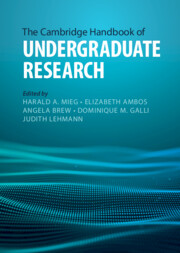Book contents
- The Cambridge Handbook of Undergraduate Research
- The Cambridge Handbook of Undergraduate Research
- Copyright page
- Contents
- Figures
- Tables
- Contributors
- Foreword
- Foreword
- 1 Introduction
- Part I Theory and Research on Undergraduate Research
- Part II Implementation, Approaches, Methods
- Part III Disciplines
- Part IV International Perspective
- 47 Introduction
- Part IV.1 Americas
- 48 Undergraduate Research in the USA
- 49 Undergraduate Research in Canada
- 50 Undergraduate Research in Argentina
- 51 Undergraduate Research in Brazil
- 52 Undergraduate Research in Colombia
- 53 Undergraduate Research in Mexico
- Part IV.2 Africa & Middle East
- Part IV.3 Asia & Oceania
- Part IV.4 Europe
- Part V Avenues for Developing Undergraduate Research
- Index
- References
51 - Undergraduate Research in Brazil
An Essential Approach for Social Change
from Part IV.1 - Americas
Published online by Cambridge University Press: 11 August 2022
- The Cambridge Handbook of Undergraduate Research
- The Cambridge Handbook of Undergraduate Research
- Copyright page
- Contents
- Figures
- Tables
- Contributors
- Foreword
- Foreword
- 1 Introduction
- Part I Theory and Research on Undergraduate Research
- Part II Implementation, Approaches, Methods
- Part III Disciplines
- Part IV International Perspective
- 47 Introduction
- Part IV.1 Americas
- 48 Undergraduate Research in the USA
- 49 Undergraduate Research in Canada
- 50 Undergraduate Research in Argentina
- 51 Undergraduate Research in Brazil
- 52 Undergraduate Research in Colombia
- 53 Undergraduate Research in Mexico
- Part IV.2 Africa & Middle East
- Part IV.3 Asia & Oceania
- Part IV.4 Europe
- Part V Avenues for Developing Undergraduate Research
- Index
- References
Summary
Brazil accounts for half of South America’s territory and population. Given this large scale and its federal structure, the country can be described as highly heterogeneous. In this context, universities have a crucial role in social change and mobility. Research is closely linked to university life. This chapter provides an overview of undergraduate research in Brazil and its impact on individuals, universities, and society. First, we present an historical outline of the development of the national education and higher education system. Second, we describe administrative issues and cultural impact. Third, we show examples of best practice, selecting specific disciplines and aspects. Finally, we summarize the main themes and provide an outlook on expected further developments concerning undergraduate research in Brazil.
- Type
- Chapter
- Information
- The Cambridge Handbook of Undergraduate Research , pp. 472 - 479Publisher: Cambridge University PressPrint publication year: 2022
References
- 1
- Cited by

